Exploring Virtual Economies and Digital Ownership in the Metaverse
Metaverse is a shared collective virtual space. It was created by the convergence of virtually enhanced physical reality and virtual space. It is changing our way of interaction, work and entertainment. Virtual economies and digital ownership is an excellent application and feature of the metaverse. Metaverse is not only transforming gaming but also changing the art, commerce and other forms of social interaction.

Virtual Economies as New Horizons
Virtual economies in the metaverse are similar to those in the real world. They entail production, distribution and consumption of goods and services but online. This type of economy relies on in-game currencies like credits or points, digital assets such as skins or NFTs, and smart contracts based on blockchain technology that ensure secure transactions and proper ownership proof.
In-Game Currencies & Goods:
In-game currencies exist within platforms like Second Life, Roblox or Fortnite. Players can acquire these currencies through playing games or buy them using real money from marketplaces for purchasing virtual items such as clothes, homes or even experiences. For instant beta testers who make AR/ VR content earn Robux (Robux can be exchanged for real money) etc. Users are able to make their own games or items then sell them on Roblox platform. The era has given rise to a prosperous economy in which developers and players can monetize their creativeness.
Digital Assets as well as NFTs:
Non fungible tokens have changed digital ownership. They allow people to own unique digital things that are verifiable. NFTs work as proof of ownership for digital art, virtual real estate and other unique goods in the metaverse. Platforms such as decentraland or the sandbox allows users trading of digital assets. They enable users to purchase and sell virtual land and assets using NFTs. This generates new investment opportunities. And it fosters a sense of belongingness and identity in the virtual world.
Digital Ownership: Redefining Property Rights in the Virtual World
Blockchain is the foundation stone of digital ownership within the metaverse because it offers transparency, security, and immutability. This redefinition of ownership brings with it a number of implications:
True Ownership and Interoperability:
Through blockchain technology, individuals own digital assets rather than platforms thereby preventing unauthorized duplication ensuring scarcity. In other words, true owner-ship enables interactions between various metaverses platforms; whereby for example an NFT used on one item across various games’ context will result in increased worthiness and usefulness.
Creative Monetization:
Previously unimaginable methods of monetizing digital creations have come up for creators. Artists, designers and developers can sell their digital wares directly to customers bypassing the old middlemen. This has democratized creativity and brought in new revenue streams that enable individuals to make business out of their interests.
Legal and Ethical Considerations:
With the growth in ownership of technology, there are concerns about legalities as well as morality. Matters such as copyright issues, privacy of personal data and online identity crisis must be dealt with properly. Governments and institutions are starting to look into regulatory frameworks that will protect digital property and make sure metaverse is a level playing ground.
The Future of Virtual Economies and Digital Ownership

Even though it is still at its infancy stage, metaverse has immense potentiality in its hands. More sophisticated virtual economies will emerge fostering innovation in various industries. Here are some future trends:
Enhanced Virtual Workspaces:
Virtual workspaces within the metaverse may become mainstream due to remote work trends. Companies could establish offices in which employees interact virtually through immersive environments. It might change how we collaborate or run our businesses in general.
Expanded Social Interactions:
The metaverse is a hub of social interactions through virtual concerts, events and even virtual tourism. Allowing users to own and show off their digital memorabilia and assets will be very significant in creating these experiences.
Integration with Real World Economies:
The distinction between the virtual economy and real life economies is set to further diminish. It will not be surprising if digital currencies or assets are integrated into the traditional financial systems making it possible for seamless transactions between the physical and virtual worlds.
Conclusion
In the era of digital ownership, the metaverse has changed how economies are organized. Virtual economies open up new ways of doing business and promoting creativity while secure property rights may be ensured by means of blockchain technology utilized in relation to digital ownership. The trajectory that the metaverse takes will undoubtedly present itself with opportunities and challenges thereby shaping the future of economic activities in terms of digital interactivity as well as other forms of businesses in general.
Thank you, friend!


I'm @steem.history, who is steem witness.
Thank you for witnessvoting for me.
please click it!
(Go to https://steemit.com/~witnesses and type fbslo at the bottom of the page)
The weight is reduced because of the lack of Voting Power. If you vote for me as a witness, you can get my little vote.
https://x.com/suboohi/status/1804460931746808209?t=2IopPHzk4xZ_gCruK9Ex5w&s=19
Upvoted! Thank you for supporting witness @jswit.
Note:- ✅
Regards,
@theentertainer